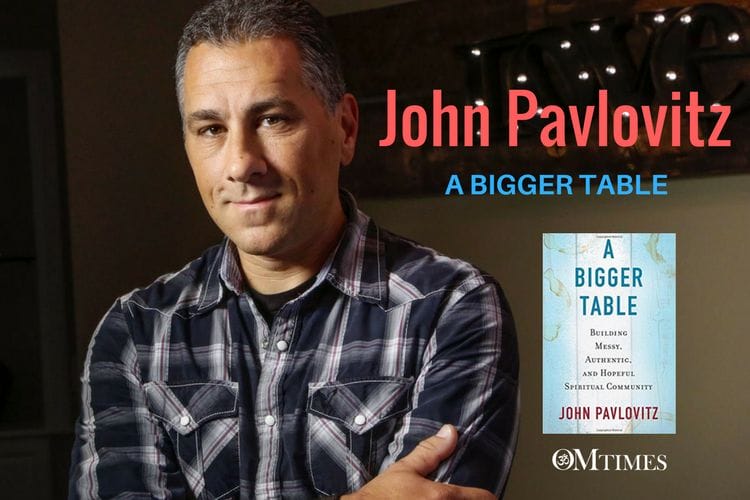John Pavlovitz: A Bigger Table

 I think right now that Christianity has a difficult time with embracing the validity of other faiths. It is another, a deep passion of mine to understand that Christianity has been my road, it’s been the way I’ve experienced many of these things, but there, some people have a very different path, and their spirituality is just as complex and vibrant and valid as my own.
I think right now that Christianity has a difficult time with embracing the validity of other faiths. It is another, a deep passion of mine to understand that Christianity has been my road, it’s been the way I’ve experienced many of these things, but there, some people have a very different path, and their spirituality is just as complex and vibrant and valid as my own.
And so, Christians in general but particularly maybe the more evangelical church here in America has trouble assigning a value to other faiths.
Sylvia Henderson: So, let’s talk a little bit about your book A Bigger Table. What is a bigger table, what does it look like and why is it so important?
John Pavlovitz: Well, for me, a bigger table is trying to find a way to have a spiritual community that would require no one to go elsewhere. So, can we set the table, can we create relationships, can we create an environment where we can bring our story to bear and come with exactly who we are and have there be enough room where we are, so there’d be no deal breakers within people?
And so it’s been a response to sort of the churches that I was seeing, the churches that I was a part of, seeing their limitations and trying to ask the question can we have something that is a more diverse representation of humanity. And I think it’s so important right now because I think we need to learn to talk about the deepest issues of our hearts and how we perceive God or how we perceive the world and what we, what we believe our purpose is. Those things are so important, and I think we need a place to just explore that and to live it out. And so, that’s the dream, that’s where it began for me.
Sylvia Henderson: You also write about what you call the four non-negotiable legs of a bigger table. What are those? Can you tell us a little bit more about that and why those, why is so important that those four non-negotiable legs be there to support that bigger table?
John Pavlovitz: Well, the journey for me was, I was living as a pastor for many years and living with that tension that I talked about. And ultimately, I talk about reaching that place where, I said I heard God’s voice telling me to leave the church where I was serving, and it came in the form of my pastor’s voice saying you’re fired. And it was really as I began to sort of live a more expansive faith as a pastor, that became the logical conclusion because I think it’s really difficult to have an expansive faith in a local church because you’re sort of beholden to that community.
But, after that time I was fired, I went back to sort of Jesus table ministry in my tradition, which was Jesus sharing a meal with someone and breaking bread with them to let them know they were seen and heard and loved and respected. And I also went back to my own sort of family tradition around the table, that sense of belong.
So, the bigger table for me is built not around theology or doctrine because it’s so divisive but just about how we’re gonna be together, how we might treat one another. Those four sort of non-negotiables were radical hospitality, which is the Italian mother’s welcome. So, you’re showered with food and affection until you can take no more. And the second is total authenticity, which is just saying that we can be the fullest version of ourselves that there is, we can believe what we can believe, we can not believe what we don’t believe, and that’s gonna be okay. And true diversity in that community is the third, which is meaning we want a representation of the entire depth of humanity. It’s not just a centered diversity or a selective diversity. And the fourth is agenda-free relationships, meaning that we gather with people not to try and fix or change or save or renovate them but just that we receive them as they are and learn from their story, listen to that story.
And so, that’s kind of radical hospitality, total authenticity, true diversity, and agenda-free relationships is really the heart of what the book is.
Sylvia Henderson: How can people on an individual level incorporate these wonderful, attributes? It seems like that is something that we need more on a global level, not just within a house of worship. It’s the most glaringly and divisive time that I think we’ve lived in this country for a long time since the Civil War probably. So, how can we reach for on an individual level to start to incorporate this, so that we can spill into this radical hospitality, total authenticity, really accepting each other’s diversity and this agenda-free relationship?
John Pavlovitz: I talk to people in the book, I tell the story of how I sort of arrived at this place over time, and it was through getting better stories, getting truer stories about people groups that I had had a preconception about. And so, I’m always telling people, people at a bigger table must be story learners. We have to keep asking ourselves the questions whose stories am I not hearing right now, who do I think I understand. Maybe I just assume that I understand them, and who is not yet welcome at the table where I gather, and that could be with my family, it could be in my workplace, it could be in my church.
So, it’s a constant striving to keep learning about people, because the more you hear people’s true and accurate stories from them, the more difficult it is to discriminate them, the more difficult it is to withhold compassion from them. So, that is, yeah, so needed on a personal level because that personal enlarging of the table, that has ripples that are so needed right now, and they’re powerful. When we live that way personally, it does affect the community around us.
Sylvia Henderson: And so, has your mission changed since the recent changes in America’s political environment? And if so, how?
John Pavlovitz: I think, the way that it’s changed it, I wrote this book, a lot of this book before we had a presidential campaign before we had an election and before we’ve had this presidency. And I went back right before the book was published and talked more explicitly because we had this new reality.
I was a bit more optimistic when I wrote the book before all this happened, but today, I’m still fully committed to the idea of the bigger table, and I know we need it now more than ever. I just see that there are more barriers to it.
And so, if anything, the way the mission has changed is knowing that we have to be really explicit in why, in giving a different voice, for me as a pastor, as a Christian, to offer a different expression of faith out there because so many people only see one real hateful version. So, you want to be sort of an expectation defining Christian for them. So, that’s how the mission has changed only in I think there’s a great urgency right now than there’s ever been to make sure that people feel seen and heard.
Sylvia Henderson: My interviewee is John Pavlovitz, and he is the author of this wonderful new book, which is all about a bigger table, allowing everyone to be included. And that really is what humanity all about. We’re really just one human race, and if we can just step out of these delusional thoughts that one race is better than another, one way of worshiping God is better than another, and that sexuality is vile and should be vilified, gosh, how much better would the world be, right? How has your life been personally impacted by all of this?
John Pavlovitz: Well, you never sort of plan to be a polarizing public figure, and I didn’t set out to be a pastor to begin with, let alone one who is very sort of visible. And it’s a really strange sort of existence to put something out into the world that comes from a very personal place. You write those words, and then those words become the line around which people stand to argue with one another.
Continue to Page 3 of the interview with John Pavlovitz
OMTimes Magazine is one of the leading on-line content providers of positivity, wellness and personal empowerment. OMTimes Magazine - Co-Creating a More Conscious Reality




